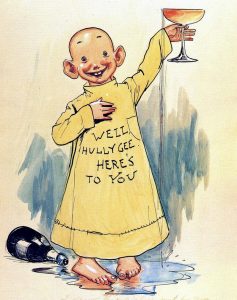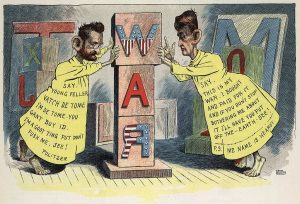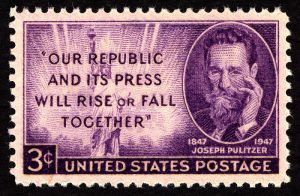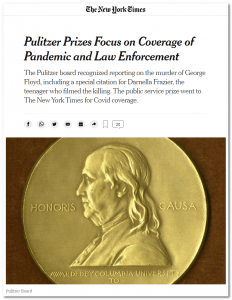When muckraking New York newspaper publisher Joseph Pulitzer died in 1911, he left a $2 million endowment to Columbia University. To this day, Pulitzer’s name is best known for the resulting Pulitzer Prizes, given each year in multiple categories by the university.
This year, This is True was under consideration for the Prize in three categories.

Pulitzer (the man) is known for the newspaper “wars” at the turn of the 20th century. He purchased the New York World newspaper for $346,000 in 1883.
Notably, in 1895 the paper introduced a comic, The Yellow Kid by Richard F. Outcault. It was featured in the paper’s new Sunday color supplement and became immensely popular. (Yes, there was color printing in newspapers in the 19th century!)
San Francisco Examiner publisher William Randolph Hearst, meanwhile, had ambitions to have a chain of important papers, and bought the New York Journal to compete in the New York City market, which was well saturated with at least 16 newspapers.

The Hearst/Pulitzer competition was fierce. Hearst lured Outcault to bring The Yellow Kid to the Journal, and both newspapers fought the other with lurid headlines featuring crime, corruption, sex, and innuendo. After the comic, the style was known as “yellow journalism,” which is to this day considered a pejorative in journalism.
Both became very wealthy, and both managed to be elected to the U.S. House of Representatives, both as Democrats: Hearst serving from 1903 to 1907 in New York’s 11th District. Pulitzer entered office in 1885 in New York’s 9th District, but Pulitzer resigned on his birthday (April 10, which he shared with me) a year later because he realized that being a leading New York City newspaper publisher gave him more power, influence, and money!
Back to Columbia University

To leave a long-lasting legacy, in 1892 Pulitzer offered money to Seth Low, president of Columbia University, the oldest university in the city, to establish the first journalism school in the world. Low turned it down.
In 1902 his successor, Nicholas Murray Butler, signaled that he would accept such an endowment. That didn’t happen until Pulitzer died in 1911. But once it received the money from Pulitzer’s will, the school founded the Columbia University Graduate School of Journalism — but it wasn’t the world’s first.
Before barging into the New York City newspaper market, Pulitzer gained fame and fortune as the leading newspaper publisher in St. Louis. When Columbia University first turned him down, Pulitzer convinced the University of Missouri to found the Missouri School of Journalism in 1908 …in Columbia, Missouri!
Both schools are still considered the top schools in Journalism today.
Columbia University has administered The Pulitzer Prizes since they started in 1917; the 105th “class” of winners was announced today. There are 15 Journalism categories, plus 7 for Books, Drama, and Music.
Enter This is True
 I didn’t go to Columbia or “Mizzou”; my journalism degree is from California’s Humboldt State University. But yes, True qualifies as a “regularly published news publication” in that it’s a weekly news commentary feature column, and thus qualifies for consideration for the Pulitzer Prize.
I didn’t go to Columbia or “Mizzou”; my journalism degree is from California’s Humboldt State University. But yes, True qualifies as a “regularly published news publication” in that it’s a weekly news commentary feature column, and thus qualifies for consideration for the Pulitzer Prize.
True qualifies in at least three different categories, and was under consideration in those three for 2021:
Explanatory Reporting
In the middle of the 2020 controversy over police shootings, Peak Stress, published 20 July 2020, walked readers step by step through the killing of a Covid mask denier who fatally stabbed a civilian, and then attacked the lone deputy who pulled him over shortly after. Rather than simply recounting the events, it explains why certain actions were taken, how the deputy cleared her malfunctioning firearm in the middle of the incident, what would normally happen next, and what did happen next, including the results of the man’s autopsy and the prosecutor’s investigation.

It was a shocking event that made national and international headlines. But no journalist covered it like I did to explain in detail what happened and why.
YouTube refused to let the video of the incident to be embedded on any web site, so I produced my own version of the video, adding slow- and stop-motion analysis with commentary to explain the situation thoroughly — and hosted it elsewhere so it could be included with the web-published story.
Commentary
Commentary, the Pulitzer Committee notes, can be created “using any available journalistic tool.” Well, how about a variety of journalistic tools? What I pulled together included This is True stories, Uncommon Sense podcast episodes, Randy’s Random editorial cartoon/memes, and even some Honorary Unsubscribe entries into one interactive multimedia look at the pandemic, with a slant toward how our thinking — or lack thereof — affected its spread and society as a whole. It was published on True’s web site on 27 December 2020, titled The Year of Covid.

The volume of coverage on the pandemic is too much for any lay person to fully grasp, especially over time as the story evolves. It’s a special challenge for a commentator to keep readers engaged week after week when they expect to be entertained.
This is True is a weekly news commentary column and, by extension, illumination of the human condition. Some in the audience are pandemic deniers and anti-maskers. I wanted to keep the doubters reading — and open to reconsidering their positions — by choosing stories to draw them in to better understand the details I wanted to illuminate. And I had to do it while keeping to the promise of the “humorous, ironic, and/or opinionated” comments that brought them to the column in the first place.
But pithy commentary alone isn’t enough to provide perspective during an unrelenting saga of illness and death. To keep readers engaged and learning the facts behind Covid-19 and the myriad ways it catches up with its victims, I used my subfeatures — the “Honorary Unsubscribe” (a brief obit to recognize some of “The People You Will Wish You Had Known”), “Randy’s Random” (meme-based editorial cartoons), editorials, and “Uncommon Sense” podcast episodes — to produce a fuller and more rounded understanding of the pandemic from multiple directions.
Examples of all of these elements were woven together into this a web-based interactive multimedia compilation to bring readers a much wider perspective, while also illustrating wide-ranging commentary.
Editorial Writing
The Pulitzer Committee says “the test of excellence [is] clearness of style, moral purpose, sound reasoning, and power to influence public opinion in what the writer conceives to be the right direction, using any available journalistic tool.”

The Jury wants up to seven examples published through the year so they can see the kind of work being done in editorials, rather than just one piece. While I published well over seven, I didn’t want to submit that many since I tend to write pretty long in my editorials, so I chose four:
- Aurora Police: Not Accountable, published 13 January
- Make Cheating Wrong Again, published 17 February
- Fixing Georgia, published 18 May, and
- Covid: Think for Yourself (Dammit!), published 16 November.
It’s a nice assortment of my editorial work on various topics with what I think is a clearness of style, with sound reasoning and a moral purpose to influence public opinion.
The Results
Each Jury is charged to come up with three “nominated finalists” out of each category’s entries — though sometimes there are four. The Pulitzer Board then chooses the winner in each category …though sometimes it gives two Prizes in a category. That happened this year in both Explanatory Reporting and Feature Writing. The Committee can also choose to not give any award in a category; that happened this year in Editorial Cartooning.

I thought my strongest entry was Peak Stress (Explanatory Reporting). It did not make it into the finals, nor did my other entries.
Professor Thomas Davidson once asked the publisher, “I cannot understand why it is, Mr. Pulitzer, that you always speak so kindly of reporters and so severely of all editors.”
“Well,” Pulitzer replied, “I suppose it is because every reporter is a hope, and every editor is a disappointment.”
Maybe that also applies to juries and committees!
Still, it was a great honor to participate and have my work be considered. I will not be discouraged from continuing to produce my best work, and occasionally put up pieces for future Pulitzer consideration.
– – –
Bad link? Broken image? Other problem on this page? Use the Help button lower right, and thanks.
This page is an example of my style of “Thought-Provoking Entertainment”. This is True is an email newsletter that uses “weird news” as a vehicle to explore the human condition in an entertaining way. If that sounds good, click here to open a subscribe form.
To really support This is True, you’re invited to sign up for a subscription to the much-expanded “Premium” edition:
Q: Why would I want to pay more than the minimum rate?
A: To support the publication to help it thrive and stay online: this kind of support means less future need for price increases (and smaller increases when they do happen), which enables more people to upgrade. This option was requested by existing Premium subscribers.

A look through the winners’ list shows a very heavy East Coast presence of large, long established (print origin) publications. I did see Buzzfeed in a few of the Finalists lists.
I suspect that your ability to combine several different formats (without a huge team) may have flabbergasted some, and since you aren’t part of the East Coast clique, they may not be cognizant of you audience reach.
As a long time reader, thanks for the good work and keep applying. Your longevity on the internet alone should get you recognition!
You are definitely ‘a winner’, no matter what the committee decided.
Is it better to have tried and failed than to never have tried at all? For this follower it’s a yes as it gave us something to root for after some dark days.
In some ways it’s probably better you didn’t win, as who knows what you would charge to subscribe to the PULITZER PRIZE willing True!
—
It’d be terrible: I wouldn’t change the price at all! -rc
It takes great courage just to try. So glad you did. FWIW, Pulitzer or not I find your work outstanding.
You take top place in our Bookmark lists, Randy!
Randy, I seem to pretty much on the same page as you, that page being “Think critically!”. I attribute this mainly to my parents who set the foundation, I can only take credit for actively honing the skill throughout my life.
But some of that credit for actively honing the skill goes to you as well. I’ve read you since before the name change (I think it was “This Just In” earlier).
Thank you, thank you, thank you, for the many years of your wisdom and insight.
Given some of the Pulitzer’s I’ve seen awarded for nothing but a popular topic (at least it seems to me) you are very deserving in any of those three categories. Good luck in future years!
—
Thanks, Andy, and having you pass along the ability to think to the next generation is a great prize in itself — for all of us. -rc
My take-away in watching the announcement live (yep), was that unless you’re from a “traditional” publication behemoth, you stand no chance. There was only one web-first entry that I saw listed as a finalist, buzzfeed of all things. They may not qualify as “traditional”, but they definitely meet “behemoth”.
Keep submitting and you’ll always be able to say you were “under consideration”. Most don’t know what that really means, I think.
Let’s hope the tide turns and more “modern” sources (and yes, even at 25+ years old, you’re “modern”) begin to have a better chance.
—
There were also freelancers in Feature Writing, Breaking News Photography, and Editorial Cartooning. -rc
Congratulations to you for entering. Even if they didn’t recognize you as a Pulitzer Prize winner, I know you are equal to any of the journalists who won. Next year!
I concur!! This is quite an honor!
—
She has to say that: she’s chief editor! 🙂 -rc
I still think you’re bucking a generation of judges that are stuck in the 20th century.
—
Could be.
I do understand that newspapers are the historical norm for the Pulitzers, but that was indeed a 20th century concept. The world has moved on, and only the strong “papers” can continue to thrive — online. -rc
I agree with Marty’s analysis.. the strong presence of “long established (print origin) publications.” with only a nod to Buzzfeed… they don’t know how to handle such a long-standing internet/email only presence.
To us, your subscribers you are a winner since very long ago. I hope the Pulitzer committee will see that soon.
As a long time reader, I must thank you for the great work and encourage you to keep on it (yes, I recognize there is in part because of selfish reasons). Your longevity on the internet and the fact that you move your readers to think and many times to even question ourselves on our believes should get you recognition!
Keep trying, we will be here keeping your back!
CONGRATULATIONS! on being nominated and considered. We, your readers, already knew you were awesome and deserving.
You are amazing!! Congratulations for being in 3 categories!
Congrats for even being in the running!
Those were all great pieces.
—
Glad you liked them, Bob. -rc
I’d say your submissions were worthy!
I really thought this was leading up to you revealing that you had won for all of it! Should have.
—
Since I know you’re the editor of a publication yourself, I especially appreciate your nod. -rc
I appreciate your reporting. Thank You!
You were a contendah, but next time you’ll win.
It’s about time you were nominated. That being said you don’t need their approval to be one of the best because you are.
Congrats on submitting your stories and being considered! There was a lot of good commentary, editorials, and reporting over the last year.
I’d forgotten that we share our alma mater….Humboldt!!! (Go Jacks!) I graduated from there in 1981 with a degree in Natural Resources Planning & Interpretation with an emphasis in Watershed Management (and worked for the Klamath National Forest for almost 36 years!)
Congrats, Randy — you are tops in my book!
—
We missed being there at the same time by *that* much! That’s great that you were also able to find a career in your major. It seems like that’s harder with some Humboldt degrees. -rc
I remember the days of the “journalist” with a “name” being syndicated through papers in the US. But, I fear, those days are gone. As well I fear that the print newspaper publication industry is on its last legs. The Pulitzer Prize was created for those types of publications.
The Pulitzer Prize needs to catch up with today’s world of online publications in order to remain relevant. That you were selected to be in three of their categories says much.
I look forward to the day when I read that you have been awarded said prize.
But for now, just know that I, and I suppose many of your readers, consistently choose you to award our prize to, than of continued readership.
Good job as always, Randy.
Pardon me for being late to the gathering here, but I am still happy to know of your nominations.
There are greats in many fields who are never widely recognized, but those who read your work know what you continue to achieve on a regular basis, and the high standard you encourage us all to uphold.
Thank you for the work. I sincerely hope the benefit to you has been of equal value.
—
I wouldn’t be here if I didn’t. I gave up one hell of a good job to do this — and I wouldn’t change a thing. -rc
I imagine the work involved in submitting, deciding what stories to submit, and following their guidelines was daunting. It would have been a wonderful honor to win but you have a very loyal following who anxiously open their e-mail to read your topics. Keep writing and I’ll keep reading.